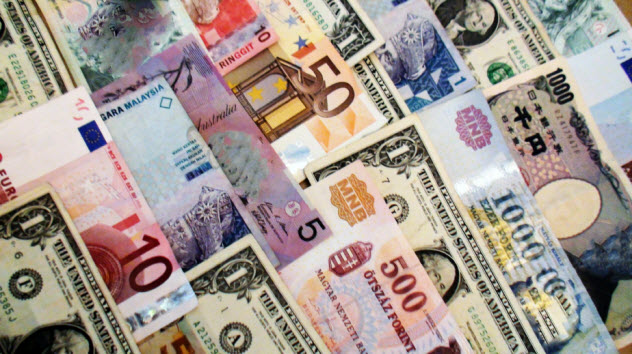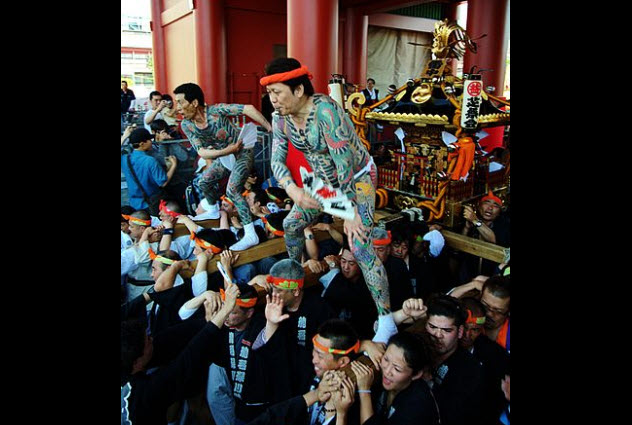 Movies and TV
Movies and TV  Movies and TV
Movies and TV  Humans
Humans 10 Times Scientists Were Absolutely Sure… and Absolutely Wrong
 Our World
Our World 10 Pivotal Moments for Life on Earth
 Movies and TV
Movies and TV 10 Most Realistic Medical TV Shows of All Time
 Creepy
Creepy 10 Eerie & Mysterious Ghosts of the Pacific Coast
 Weird Stuff
Weird Stuff 10 Typos That Accidentally Changed History
 History
History 10 Times Trickery Won Battles
 Technology
Technology 10 Awesome Upgrades to Common Household Items
 Misconceptions
Misconceptions 10 Hilarious (and Totally Wrong) Misconceptions About Childbirth
 Weird Stuff
Weird Stuff 10 Warning Labels That Exist Because Someone Actually Tried It
 Movies and TV
Movies and TV 10 Zombie Movies That Will Actually Terrify You
 Humans
Humans 10 Times Scientists Were Absolutely Sure… and Absolutely Wrong
 Our World
Our World 10 Pivotal Moments for Life on Earth
Who's Behind Listverse?

Jamie Frater
Head Editor
Jamie founded Listverse due to an insatiable desire to share fascinating, obscure, and bizarre facts. He has been a guest speaker on numerous national radio and television stations and is a five time published author.
More About Us Movies and TV
Movies and TV 10 Most Realistic Medical TV Shows of All Time
 Creepy
Creepy 10 Eerie & Mysterious Ghosts of the Pacific Coast
 Weird Stuff
Weird Stuff 10 Typos That Accidentally Changed History
 History
History 10 Times Trickery Won Battles
 Technology
Technology 10 Awesome Upgrades to Common Household Items
 Misconceptions
Misconceptions 10 Hilarious (and Totally Wrong) Misconceptions About Childbirth
 Weird Stuff
Weird Stuff 10 Warning Labels That Exist Because Someone Actually Tried It
10 Startling Reports About The Olympics
The Olympics remain one of the most prestigious sporting events in the world. Countries all over the world spend enormous amounts of money, athletes dedicate their lives to training, and enthusiasts come from everywhere to watch the games. However, while this all seems good on the surface, many shocking revelations have come to light.
10 Russia Had An Untraceable Drug For The Sochi Winter Olympics

Before the 2014 Sochi Winter Olympics, the World Anti-Doping Agency received word that there was a human growth hormone (HGH) available in Russia that was completely untraceable by any standard Olympics drug test. If true, that would have given the Russians a huge advantage in virtually every sport in the Winter Olympics that year. So the question on everyone’s mind was: How true was this claim?
German broadcaster WDR (which has a reliable reputation in the media) was behind the shocking report. They sent undercover reporters to the Russian Academy of Sciences in Moscow. There, they interviewed a scientist who claimed that an untraceable HGH had been created called full-size MGF, which had been previously tested on animals.
In the words of the scientist, it “works two times faster than a normal muscle tonic and cannot be detected by the doping authorities.” He then went on to say that it would cost €100,000 to “prepare” an athlete for the Winter Olympics.
It is well-known that there are stringent testing standards that improve constantly, so most coaches and athletes wouldn’t even risk supposedly “untraceable” drugs. Nevertheless, it was claimed that some athletes would not pass up the opportunity to have a possible advantage.
This became even more of a worry when full-size MGF was tested by German scientists. They proved how effective the drug really was. Luckily, new testing was developed to help prevent abuse of supposedly “untraceable” drugs.
9 The 2016 Rio Olympics Have Been Brutal On The Locals

Ever since Rio de Janeiro was given the rights to host the Olympics in 2016, the Brazilian government has been displacing the locals to prepare for the games. While some say this is just about the games, others claim that there is an ulterior motive.
It has been reported that the Brazilian government is deliberately destroying poor neighborhoods to make way for infrastructure for the coming events. Specifically, several locals were forced out of their homes so that a high-speed bus lane could be built from the international airport to Barra de Tijuca, the neighborhood where most of the Olympic events will be held.
Since 2009, over 22,000 families have been moved from their homes because their homes were labeled “at risk” or, more likely, in the way of proposed Olympic developments. Many families haven’t received any compensation for the destruction of their homes due to legal issues surrounding much of the property.
Most of these families have been resettled in government developments far from the inner city where they are employed, which causes untold economic hardships. The government claims that only 344 families—all living in the favela of Vila Autodromo—have been resettled due to the Olympics.
According to housing activists, the Rio city officials have been using the Olympic developments as a way of segregating the rich and the poor in the city. The housing developments to which many people are moved have no convenient bus routes for commuters, no local schools, increased utility costs, and unofficial “militias” that extort money from the residents in return for security.
8 Chinese Abuse In The London Olympics
In many countries, winning the gold in the Olympics is the only way to prove your worth. If you fail, you’re considered a social pariah; if you win, then you become a national hero. To achieve the top prize, many coaches and athletes will go to extreme lengths to become and remain a victor.
China is one of the nations where this happens. During the 2012 London Olympics, allegations emerged that Chinese coaches were grossly abusing their teams. Apparently, their heartless behavior begins as soon as the athlete is recruited.
Once children show a talent for sports in China, they are immediately uprooted and isolated from their families so that they can train without distractions. Coaches often deliberately withhold news from their athletes, no matter how personal, to reduce stress that is unrelated to the sport.
Such was the case with Olympic diver Wu Minxia. She was not told that her mother had died from cancer until after she had completed her routine during the 2012 Olympics. However, she had been so emotionally removed from her parents that when she received the news, she showed no sadness and claimed that her team was her “family.”
Many coaches have also claimed that the Chinese routinely use physical abuse to control their athletes. One coach said, “The women are literally beat into submission.”
They claim that this abuse starts at a younger, more vulnerable age. Eventually, the coaches are able to dictate the athletes’ every waking moment. The enormous cash bonuses offered by the Chinese to Olympic winners apparently encourage this extreme behavior.
7 USA Competitive Swimming Sex Scandal

A frightening trend has been discovered among American competitive swim coaches. Although it has long been unnoticed or simply ignored, some coaches have been sexually abusing their athletes. Several coaches have received harsh punishments for their behavior, but this has done nothing to scare others into following the law.
As of 2014, at least 100 competitive swim coaches have been given lifetime bans for sexual abuse. Many of these men were and are repeat offenders. For example, swim coach Andy King was convicted of 15 sexual abuse charges. These repeated offenses occurred mainly because this sort of behavior was swept under the rug to protect the integrity of the sport.
Much like other sex offenders, the coaches use a process known as “grooming” in which they build up the trust and affection of a young athlete as a means to an end. What starts as an innocent “friendship” eventually deteriorates into sexual abuse. The coaches do this by giving a warped sense of intimacy to their victims, which these young athletes accept as normal.
This type of exploitation may have flourished in an era when athletes remained quiet. But people are more willing to reveal the truth today. With such a clear-cut pattern and witness confirmations, it would stand to reason that the authorities are devoting more effort to combating this abuse.
The Olympics and the US government have begun to crack down on hurtful behaviors toward young athletes, but many instances of abuse are not recognized. Therefore, many people believe that there is far more abuse than officially reported.
6 The Olympics Are A White Elephant

A white elephant is a possession that can’t be sold for any real profit and that is expensive to maintain. Such is the case with the Olympics. Many cities don’t earn a profit from hosting this prestigious event. Today, the Olympics have become less of a cash cow and more of an expensive trophy to show off the superiority of the host country and city.
In 2004, Athens budgeted $1.5 billion to host the games but ultimately spent an astounding $16 billion, an astronomical sum for a cash-strapped country like Greece. Montreal spent so much for the 1976 Olympics that it took 30 years for the city to pay off its debts. Rio de Janeiro has already spent $25 billion on infrastructure for those watching and participating in the 2016 Olympics.
It has become a multibillion-dollar game of keeping up with the Joneses for each successive host city. To show off their economic superiority, the latest host tries to one-up the previous hosts.
Many of the extravagant construction projects undertaken by host cities are short-term. When the Olympics are over, lavish facilities are often left to deteriorate for the simple reason that no one wants to use them.
This is why many American cities—Boston, San Francisco, Los Angeles, and Washington—have been reluctant to lobby for the title of host city. Make no mistake, a few of the games have been profitable: Los Angeles 1984, Barcelona 1992, and Seoul 1998 were all financial boons for the host cities.
However, for many countries, profits don’t matter. The extravagant expenses are an investment in propaganda pieces to show off the supposed financial strength of their country. In 2008, the Beijing Olympics were considered a success because of the prestige the event brought to China.
However, the 2004 Athens Olympics were a failure because Greece overestimated the event’s profit potential—a mistake that helped to plunge the country into bankruptcy. Most experts agree that the Olympics are less of a financial opportunity and more of an expensive party.
5 Olympic Athletes Have A Hard Time Becoming Normal

What it means to be “normal” depends on one’s perspective. But we can probably agree that the life of an Olympic athlete is far different from that of most people.
They begin training at an extremely young age, dedicating their lives and sacrificing youthful experiences so that they can have a shot at achieving athletic greatness. But once that time has passed, their lives radically change. No longer do they spend all of their time training; they now have to become like the rest of us.
This is understandably hard because they have never experienced many of the daily situations that comprise a “normal” life. Diann Roffe, who won the silver in giant slalom in 1992 and the gold for Super G in 1994, announced her retirement from sports when she was 26. Afterward, she spent a long time in a “big bucket of melancholy” because she couldn’t recapture the excitement of being an Olympic athlete.
Still, she was one of the luckier athletes. Some athletes have taken darker and more lethal roads. Scott Miller, a silver medalist in the 1996 Olympics, was arrested for drug possession in 2014. Jeret “Speedy” Peterson, a silver medalist in 2010, struggled with alcoholism and tragically killed himself a year after he won.
When spectacular athletes emerge, they are thrust into the spotlight and showered with media attention. Obviously, being the center of attention can be intoxicating. But once the press moves on, it can be a devastating blow.
Many struggle with their identities and feelings of self-worth because they are now average Joes and have to deal with the realities of life as a regular person. Although some have led well-adjusted lives after the Olympics, many others have struggled to make the transition to normality.
4 Russia May Have Sabotaged The 2012 London Olympics
According to a report by the World Anti-Doping Agency (WADA), the Russians sabotaged and intimidated drug testers during the 2012 London Olympics to allow their athletes to get past the drug regulations. The WADA report claimed that the FSB, a successor to the Soviet KGB, was behind this conspiracy. The alleged unethical behavior of the Russians was far-reaching.
First, the FSB offered bribes to officials. Then independent drug-testing officials were intimidated and spied on. FSB agents also infiltrated the laboratories, tampered with samples, and threatened others in the lab.
Before samples were sent to the WADA-accredited Russian laboratory in Moscow, they were sent to a “shadowy” secondary facility on the outskirts of the city. There, the samples were screened and subsequently altered if they came out positive for performance-enhancing drugs (PEDs).
If positive samples managed to get to the accredited lab, the lab director was bribed with cash payments. In one case, the director supposedly destroyed 1,500 tests when he heard that WADA was going to investigate. Phone calls by Russian officials were found to make frequent references to slang terms for steroids, other stimulants, and PEDs.
As a result of these findings, WADA has called for Russia to be banned from the 2016 games in Rio de Janeiro. Russia claims that WADA doesn’t have the authority to order such an action. As of February 2016, we don’t know if the International Olympic Committee will do anything about these shocking allegations.
3 The Japanese Olympics Are In The Pocket Of The Yakuza

The yakuza is an organized crime syndicate in Japan, which is often thought of as the Japanese Mafia. Although the organization is not illegal, it is regulated. There are over 60,000 members, and many of them are quite public about their association with the yakuza. Despite this, the US Department of the Treasury has imposed sanctions on the Sumiyoshi-kai, the second largest yakuza organization, which is led by Hareaki Fukuda.
So how does this affect the Olympics in Japan? There is a litany of evidence that Hidetoshi Tanaka, the vice-chairman of the Japanese Olympic Committee, is closely tied to Fukuda. Photographs, police reports, other documents, and verified testimony from individuals associated with the yakuza have all shown that the Japanese Olympic Committee is in bed with the yakuza.
Tanaka is friends with Fukuda and at least one person in the Yamaguchi-gumi, another large criminal organization. In addition, former Japanese Prime Minister Yoshiro Mori, who became head of the Tokyo Organizing Committee for the Olympic and Paralympic Games, has been accused of having yakuza ties.
All of this creates quite a problem for the 2020 Olympics in Tokyo. It is illegal for an individual or an organization to associate with or provide funds to the yakuza. If it can be proven that so many top Olympic officials are in the pocket of the yakuza, it could rock the proposed Tokyo Olympics to the core.
Tanaka, who was an amateur sumo champion, has lobbied to have sumo wrestling become an official Olympic sport. In 1996, Tanaka allegedly consulted with Kyo Eichu, the consigliere of the Yamaguchi-gumi, to make this happen.
However, Eichu was prosecuted for financial crimes in 1999 and couldn’t assist Tanaka. This wasn’t the end of Tanaka’s association with the Yamaguchi-gumi, though. There are photographs that show him with the head of the gang in 2005. Despite all of the testimony and evidence against the Japanese Olympic Committee, the 2020 Tokyo Olympics are still going on as planned.
2 The Bidding Process Is Notoriously Corrupt
For the most part, the International Olympic Committee (IOC) chooses a host city for the games according to which city will pay the most money. Unethical? Of course. Effective? Definitely.
Most recently, it was revealed that Turkey was almost going to host the 2020 Olympics, but they didn’t pay bribes. In the end, Japan secured the 2020 Olympics after paying $5 million in sponsorship money to members of the IOC.
This isn’t a new practice. Many still remember the revelation that extensive bribery had led to Salt Lake City hosting the 2002 Winter Olympics. The corruption was so extensive in Salt Lake City that 15 officials faced criminal charges of racketeering, fraud, and conspiracy.
Approximately $1 million was spent on sponsorships to secure the city. But the charges were thrown out by the judge in 2003. Although the federal government’s case failed, it did shine a light on the process of host city selection.
Nevertheless, corruption still exists, as in the case of Tokyo 2020. The main character in this drama is Lamine Diack, the 82-year-old former president of the International Association of Athletics Federation (IAAF), who wanted a $5 million sponsorship for his league.
Turkey refused to pay; Japan didn’t. It’s as simple as that. WADA, which first discovered this information, has said that bribery harms the integrity of the Olympics as much as doping and cheating.
1 Many Of The Events Are Fixed
Recently, several events in the Olympics have been proven to be fixed. However, it’s almost certain that cheating has been going on much longer.
In the 2012 Olympics in London, Azerbaijani boxer Magomed Abdulhamidov was knocked down an incredible five times by Japanese boxer Satoshi Shimuzu. It was one of the most amazing matches in Olympic history, but something unusual happened. Knockdowns are extremely rare in Olympic boxing, but this happened multiple times throughout the match.
The judges gave Azerbaijan the win. Fans booed, but the judges insisted that their ruling was final. Then BBC Newsnight presented evidence that Azerbaijan had paid millions so that two athletes would win gold medals. The match had been fixed.
Evidence showed that Azerbaijan made a $9 million bank transfer to AIBA, which manages Olympic boxing. Of course, AIBA said that the allegations were groundless. But in a twist, AIBA officials upheld Shimuzu’s appeal and gave him the win.
This isn’t the only time that a blatant fix was uncovered. In the 2002 Salt Lake City Winter Olympics, a French judge gave Russian skaters a higher score as part of a deal that would give the French skaters a good score later. Eventually, the Russians and the Canadians were given dual gold medals, and the rules for skating competitions were changed.
After the 2014 Sochi Olympics, there were allegations that the US and Russia had worked together during the skating events. This resulted in a Russian gold medal for team dance while American skaters won for duet. However, as of February 2016, many people don’t believe these allegations, and they have yet to be proven.
Gordon Gora is a struggling author who is desperately trying to make it. He is working on several projects, but until he finishes one, he will write for Listverse for his bread and butter. You can write him at [email protected].


